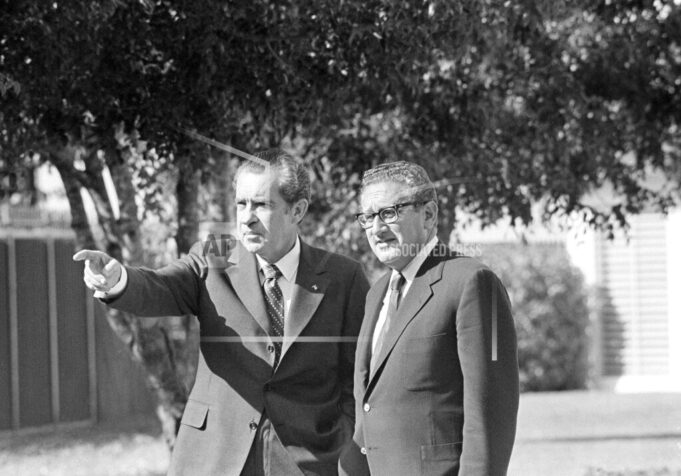Henry Kissinger, the former U.S. Secretary of State to Richard Nixon and Gerald Ford, recently celebrated his 100th birthday, with much fanfare. Kissinger began his long infamous life journey on May 27, 1923, as a Jewish refugee fleeing Nazi Germany with his family in 1938. His life history has been chronicled by journalists and historians as responsible for “countless atrocities.”

In fact, according to New York Magazine’s Jonathan Guyer, he was responsible for a prolonged and expanded Vietnam War with the bombing of Cambodia and Laos, killing hundreds of thousands, perhaps millions, of innocent people. Kissinger also assisted in helping empower genocidal militaries in Pakistan and Indonesia, not to speak of the enabling of juntas that overthrew democracies in Chile and Argentina.
“He’s often called a war criminal, and the long-running social media joke is that he’s still alive while so many better humans are dead,” wrote Guyer in his magazine article, “I Crashed Henry Kissinger’s 100th-Birthday Party: The elite love him but for some reason won’t say why.” According to renowned philosopher and linguist Norm Chomsky, “Henry Kissinger would certainly be brought to trial for his role in the bombing (of Cambodia called ‘Operation Menu’), if the world were governed by justice, not forces.”
No such attribution is ever with as much substance given to Kissinger’s “sordid” African diplomacy. To fully understand this centurion you need go no further than his doctoral thesis at Harvard on the diplomacy of the Congress of Vienna (1814-1815). This future protector of U.S. imperialist global machinations argued that “legitimacy” in international affairs rested on “establishing a balance between powerful states (like the U.S. and its European counterparts) rather than promoting justice.”
Assistant Secretary for African Affairs Donald Easum had some positive African initiatives, including pushing to remove South Africa’s apartheid regime. While under the employ of Secretary Kissinger, Easum said Nigerian Foreign Minister Joseph Garba told the then Secretary of State: “You have a good man (Easum) in Lagos.” Kissinger’s reply was, “Good for whom, you (Africa) or us (the U.S.)?”
During his tenure as assistant secretary, Easum noted Kissinger’s lack of interest in “Black Africa.” According to American Diplomacy: Insight and Analysis from Foreign Affairs Practitioners and Scholars, “Now it began to look more like disdain.” In addition, “African ambassadors were being routinely rebuffed by Secretary Kissinger’s office … African permanent representatives to the United Nations and visiting African foreign ministers felt similarly neglected.”
When Kissinger saw an opportunity to shine, he determined to seize what he considered a timely opportunity to display America’s (and his own) strength in Angola. “He believed,” noted Easum, “that defeating the MPLA (People’s Movement for the Liberation of Angola), which he considered pro-Soviet, could expunge the image of a flabby United States in retreat after Vietnam. Moreover, he thought he could do it on the cheap with clandestine CIA collaboration. He was soon to be proven dead wrong.”
Easum, whose days at the U.S. State Department were numbered, had managed to co-exist for 14 months with Kissinger. His replacement, Nathaniel Davis, lasted less than four. His appointment angered many African leaders who registered strong objections to the appointment. Nominated as Easum’s replacement on January 8, 1975, he was not confirmed by the Senate until March 11 and not sworn in as assistant secretary until April 2.
“He submitted his resignation letter in late July upon learning that President Ford, ignoring his written dissent, had approved the Kissinger/CIA recommendations for covert intervention in Angola,” noted American Diplomacy.
According to the New York Times, when the Foreign Ministers of the Organization of African Unity, which at the time represented 42 African nations, condemned Davis’s appointment in February, the stated objection was that he had been Ambassador to Chile at the time of the suspected Central Intelligence Agency involvement in the overthrow of President Salvador Allende. Add to that, stated a Nigerian official, was “America’s know nothing, do-nothing, don’t give a damn foreign policy in Africa.” Follow @JehronMuhammad on Twitter













